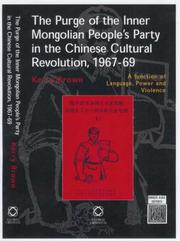| Listing 1 - 10 of 131 | << page >> |
Sort by
|
Book
Year: 1958 Publisher: Paris: Les îles d'or,
Abstract | Keywords | Export | Availability | Bookmark
 Loading...
Loading...Choose an application
- Reference Manager
- EndNote
- RefWorks (Direct export to RefWorks)

ISBN: 9789004213937 9781901903492 1901903494 1281906441 9786611906443 Year: 2004 Publisher: Leiden;Boston BRILL
Abstract | Keywords | Export | Availability | Bookmark
 Loading...
Loading...Choose an application
- Reference Manager
- EndNote
- RefWorks (Direct export to RefWorks)
During the Chinese Cultural Revolution from 1967 to 1969, some 16,000 Mongolians died and over a quarter of a million suffered injury during the purge of what was claimed to be a separatist party in the Inner Mongolian region. This study looks at the purge through an analysis of the voices found in contemporary documents - those of Red Guard groups, local leaders felled during the campaign, and the new leaders put in place by the central government in Beijing. At the heart of this was the struggle for domination by a central government asserting national unity, opposed to any expression of local particularities in Inner Mongolia. The author examines the discourse strategies by which central government attempted to impose total control , asserting a dominant ideology and narrative based on Marxism-Leninism. The volume offers a unique insight into the relationship between language and culture of political power in modern China, at a time of crisis and violence.
Political purges --- Politics and government --- Purges politiques
Book
ISBN: 9780197647547 0197647545 0197647553 9780197647554 Year: 2023 Publisher: New York (N.Y.): Oxford Unitersity Press,
Abstract | Keywords | Export | Availability | Bookmark
 Loading...
Loading...Choose an application
- Reference Manager
- EndNote
- RefWorks (Direct export to RefWorks)
Political purges --- Political purges --- State-sponsored terrorism --- Soviet Union
Book
ISBN: 0333392604 Year: 1985 Publisher: Basingstoke : Macmillan,
Abstract | Keywords | Export | Availability | Bookmark
 Loading...
Loading...Choose an application
- Reference Manager
- EndNote
- RefWorks (Direct export to RefWorks)
Political purges --- Secret service --- History
Book
Abstract | Keywords | Export | Availability | Bookmark
 Loading...
Loading...Choose an application
- Reference Manager
- EndNote
- RefWorks (Direct export to RefWorks)
Book
ISBN: 9780511815362 9780521514453 9780521735506 9780511679308 0511679300 9780511676796 0511676794 0511815360 0521514452 0521735505 1107206227 1282525891 9786612525896 0511678053 0511681283 051168326X Year: 2010 Publisher: Cambridge New York
Abstract | Keywords | Export | Availability | Bookmark
 Loading...
Loading...Choose an application
- Reference Manager
- EndNote
- RefWorks (Direct export to RefWorks)
This book tackles three puzzles of pacted transitions to democracy. First, why do autocrats ever step down from power peacefully if they know that they may be held accountable for their involvement in the ancien régime? Second, when does the opposition indeed refrain from meting out punishment to the former autocrats once the transition is complete? Third, why, in some countries, does transitional justice get adopted when successors of former communists hold parliamentary majorities? Monika Nalepa argues that infiltration of the opposition with collaborators of the authoritarian regime can serve as insurance against transitional justice, making their commitments to amnesty credible. This explanation also accounts for the timing of transitional justice across East Central Europe. Nalepa supports her theory using a combination of elite interviews, archival evidence, and statistical analysis of survey experiments in Poland, Hungary, and the Czech Republic.
Democratization --- Political purges --- Post-communism --- Transitional justice --- Justice --- Human rights --- Lustration (Political purges) --- Political parties --- Political party purges --- Purges, Political --- Purges --- Social Sciences --- Political Science
Book
Year: 1970 Publisher: Paris : Union générale d'éditions,
Abstract | Keywords | Export | Availability | Bookmark
 Loading...
Loading...Choose an application
- Reference Manager
- EndNote
- RefWorks (Direct export to RefWorks)
Communism. --- Zhongguo gong chan dang --- Purges.

ISBN: 0804707693 Year: 1971
Abstract | Keywords | Export | Availability | Bookmark
 Loading...
Loading...Choose an application
- Reference Manager
- EndNote
- RefWorks (Direct export to RefWorks)
Political purges --- Czechoslovakia --- Politics and government
Book
ISBN: 9625820116 Year: 1995 Publisher: 香港 大公報出版有限公司
Abstract | Keywords | Export | Availability | Bookmark
 Loading...
Loading...Choose an application
- Reference Manager
- EndNote
- RefWorks (Direct export to RefWorks)
Book
ISBN: 3593339129 Year: 1988 Publisher: Frankfurt Campus
Abstract | Keywords | Export | Availability | Bookmark
 Loading...
Loading...Choose an application
- Reference Manager
- EndNote
- RefWorks (Direct export to RefWorks)
Communist party purges --- Political purges --- Trials (Political crimes and offenses) --- History
| Listing 1 - 10 of 131 | << page >> |
Sort by
|

 Search
Search Feedback
Feedback About UniCat
About UniCat  Help
Help News
News